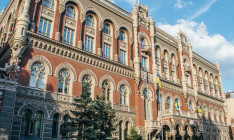Finance
Government regulationThe NBU plans to withdraw more than a dozen banks from the financial market by the end of the year

The National Bank of Ukraine (NBU) made a list of more than a dozen small and medium-sized financial institutions that should be pulled out of the market. The central bank already submitted it to the management of the Deposit Guarantee Fund (DGF), a banker close to the NBU management told Capital. The list of «unlucky» ones includes Zlatobank, the Ukrainian Development Bank, CityCommerce Bank, Piraeus Bank, Marfin Bank, Bank Cambio, Unison Bank, Omega Bank, Legbank, Astra Bank and a number of other financial institutions. In general, almost 30 banks could be withdrawn from the market in two stages in the coming months. For this purpose the fund is actively hiring new, qualified employees to hold the positions of provisional administrators.
On the way out
The official reasons for the upcoming withdrawal of the aforementioned financial institutions from the market are their involvement in money laundering and insolvency. According to unofficial versions, some of them will be penalized for their ties with the «family business» of the runaway President Viktor Yanukovych. For example, one of the banks on the list — VBR — is owned by the former president’s son Oleksandr Yanukovych.
The DGF still denies the existence of such lists. «Perhaps there is a list of troubled banks, but on grounds of bank secrecy, we do not disclose their names. As soon as the decisions on the insolvency of the banks are made, we will publish such information on our website,» said a representative of the press service of the fund.
«I believe this is an absolutely right decision to withdraw all banks at the same time. This purifies the payment system and relations between banks and mitigates the problems of insolvent financial structures. Insolvent banks force other financial institutions to close interbank limits on one another,» Chairman of the Board of the Ukrainian Interbank Currency Exchange Anatoliy Hulei commented on the situation. He added that the withdrawal of the aforementioned financial institutions is not likely to have a negative impact on the market, seeing as those banks have not shown serious activity for several months now.
The decision on withdrawal of the banks associated with the previous government is not only politically grounded, says Head of the Financial Ratings Department at IBI-Rating Anna Apostolova. She believes quite often such financial institutions were used for high-risk transactions.
However, Senior Analyst at the Expert Rating Agency Vitaliy Shapran disagrees with such point of view. He says dissolution of the banks on grounds of their involvement with the previous government or suspicion of money laundering is an unbecoming luxury for the NBU at this stage. The crisis in the banking sector has become one of the main reasons for devaluation of the hryvnia, says Shapran, and it would be very irrational to escalate the situation by increasing the debt burden on the DGF.
«However, if the NBU, the Prosecutor General’s Office and the SBU have evidence of involvement of certain banks in money laundering or financing of terrorists, such financial structures could be nationalized. I am surprised that the government still burdens the fund, thereby destroying the integral property complexes of operating banks, instead of making them beneficial as government property,» he added.
Operation Dissolution
The main problem of the aforementioned banks is the deterioration of the quality of their assets, says Apostolova. In addition, the outflow of client funds created liquidity problems. However, based on financial statements only some of these banks are breaking the rules of the NBU. For example, of all the banks on the list only the Legbank has violated the requirement for regulatory capital adequacy (8.9%, while the regulator demands the minimum rate of 10%).
Including Cambio Bank to the list was also predictable. At the end of October Capital suggested that the NBU would soon withdraw it from the market. The bank’s financial position leaves much to be desired. Based on the results of the 3rd quarter of 2014, it violated a number of requirements on prudential standards — for example, the rate of the maximum credit exposure per counterparty. For Cambio it was 32.72%, while the regulator set its maximum at 25%. Also, the current liquidity is 0% according to the bank’s statements, while the required minimum is 40%.
Noteworthy is that certain European banks are also on the black list, for example, the Marfin Bank in Cyprus. After the bankruptcy of its parent bank, its manager — the Bank of Cyprus — has repeatedly tried to sell it, but failed. During this time the bank has significantly scaled down its branch network and has lost qualified staff and solid customers. «The bank underwent several rounds of downsizing. Its owner is not interested in bearing the costs for recapitalization of the bank,» said one of the bank’s employees on condition of anonymity.
Capital’s source in the NBU says financial institutions in which the DGF has already introduced provisional administration for the operation of conversion centers and illegal money laundering (the Axiom Bank (previously the Sigmabank), InterKreditBank, Melior Bank, Green Bank and AktaBank) will be dissolved regardless of the existence of buyers.
Уважаемые вкладчики CityCommrceBank! Инициативная группа приняла решение о проведении АКЦИИ вкладчиков нашего банка возле НБУ, на Институтской, 9. Цель акции — поддержка наших требований о наведении законного порядка в работе Ситикомерцбанка и немедленном решении вопроса возвращения вкладов в связи с окончанием срока работы куратора НБУ(180 дней истекают 19 ноября). НБУ обязан либо отозвать лицензию, либо обеспечить полноценную работу банка. Акция состоится 19 ноября, в 15-00. В этот день, представитель инициативной группы будет иметь личный прием у 1-го заместителя главы НБУ — Писарука. Просим всех, прийти и поддержать наши требования. 19 ноября, среда, 15-00, возле НБУ.













 of the agreement of syndication with Financial Times Limited are strictly prohibited. Use of materials which refers to France-Presse, Reuters, Interfax-Ukraine, Ukrainian News, UNIAN agencies is strictly prohibited. Materials marked
of the agreement of syndication with Financial Times Limited are strictly prohibited. Use of materials which refers to France-Presse, Reuters, Interfax-Ukraine, Ukrainian News, UNIAN agencies is strictly prohibited. Materials marked  are published as advertisements.
are published as advertisements.